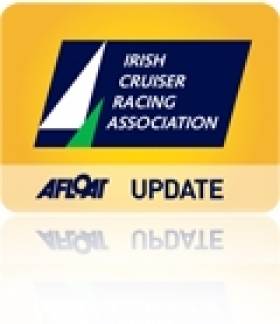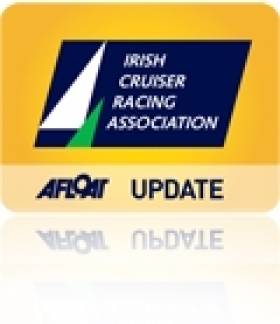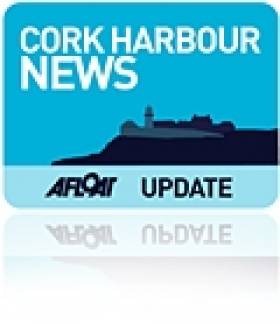Displaying items by tag: Carrigaline
Cruiser Racers Head for Royal Cork
Simon McGibney of WIORA confirmed there are already at least 15 boats interested in travelling to the event to join with the Cork, Kinsale and East coast boats. There is also the tantalising prospect of the fleet being joined by no less than ten quarter tonners from the UK who also plan to sail in the Sovereign's Cup at Kinsale the following week. Most of these British boats are crewed by professionals and will race with the Irish Class three fleet. They will, however, be scored separately and will receive a separate trophy.
Sailing with the Quarter Ton fleet will be Anchor Challenge, beautifully restored and modified by former owner Peter Morton, and now in the ownership of Eamon Rohan. At the weekend our spy spotted an all white gleaming boat wending its way up the Kinsale Road and wondered could this possibly have been Anchor Challenge and, if so, will we see a battle between the all black Tiger and the all white newcomer??
For the duration of the ICRA National Championships there will be subsidised launching at Ringaskiddy for all trailerable boats. In addition a very attractive accommodation package has been arranged for all ICRA competitors at the Carrigaline Court Hotel. They are offering three nights B/B plus one evening dinner from Thursday to Saturday and free B/B for Sunday night at €129 per person sharing.
A crew list has been set up by RCYC for skippers wishing to acquire crews with local knowledge and Race Officers for the event will be the hugely experienced Peter Crowley and Richard Leonard.
ICRA Commodore Barry Rose was delighted to inform the meeting that Yacht Designer Mark Mills has joined the ICRA committee where his expertise and wide knowledge will be greatly appreciated. Mark gave a most interesting report on recent developments re racing matters. One item referred to the fact that boats with bulb keels will now be more severely rated and another item of interest is discussion going on with regard to changing the rating bands for the 2012 Commodores Cup. It is believed there is a move afoot to lower the bands i.e. the current middle rated boat may be the big boat for the 2012 event.
Offshore Boss to Address ICRA Conference
Irish Sea Offshore Racing (ISORA) Chairman Peter Ryan is to address next month's Irish Cruiser Racer (ICRA) conference in Carrigaline, Co.Cork. The National YC commodore will speak on the promotion of offshore racing and how in the course of a few seasons Ryan has rekindled a section of the sport that had been in decline on both sides of the Irish Sea.
The Conference takes place on Saturday, November 13th at Carrigaline Court Hotel. The day-long conference chaired by Commodore Barry Rose with two sessions 11-1 and 2-4pm will take in all aspects of cruiser racing including how Ireland won this year's Commodores Cup. A special event is being arranged to mark the Cup coming to Ireland for the first time.
Hundreds Gathered for Cork Harbour Open Day
Cork Harbour Open Day proved to be a great success with hundreds of people enjoying the harbour and the free family events on offer. Throughout the day, the LE Aoife at Horgan's Quay welcomed families and children on board where they were given a tour of the ship and an insight into Navy life. The sailing race from Cobh to Blackrock, sponsored by the Port of Cork, was a huge success with over 50 boats taking part. Blackrock Castle opened the tower to the public and was busy throughout the day with people using the tower to watch the boats sail through the finish line at Blackrock.
Camden Fort in Crosshaven attracted hundreds of visitors to see the newly restored rooms and to learn more about the 'Rescue Camden' project. Also in Crosshaven the Coastal Rowing Association organised their end of season championship regatta where Passage West won all eleven races and the RNLI Station opened to the public.
'Dreamer' the fastest rigid inflatable boat (RIB) round Ireland was at the Port of Cork Marina for all to see. Built locally by Gale Force Ventures in Carrigaline and owned by current round Ireland record holder, Phillip Fitzgibbon from Co. Kerry, the 10 metre RIB can reach a speed of 65 knots.
Further events such as the World Rescue Challenge on North Custom House Quay, attracted large crowds over the whole weekend and in Cobh, the 'See You in Cobh' committee organised a crab fishing event on the promenade with over 80 children taking part.
One of the organisers of Cork Harbour Open day, Sara Dymond was thrilled with the day saying: 'The sun shone in Cork Harbour on Saturday and showed the harbour in all its glory. Cork Harbour Open Day aims to raise awareness of the different activities available for people in the harbour both on and off the water and this year we saw an exceptional turnout of people of all ages. There are endless activities to do in the Harbour and this year proved how popular the harbour is and how much people enjoy it. We hope to expand on this for next year.'
She continued: 'Thank you to all those who arranged events and helped out on the day.'
The idea for a Harbour Open Day emerged from discussions between various stakeholders involved in the development and implementation of the Integrated Strategy for the Harbour. A group comprising representatives from UCC, City and County Councils and the Port of Cork set about working together to engage users of the Harbour and to organise the Open Day.
Images from Bob Bateman on the Afloat Gallery HERE































































